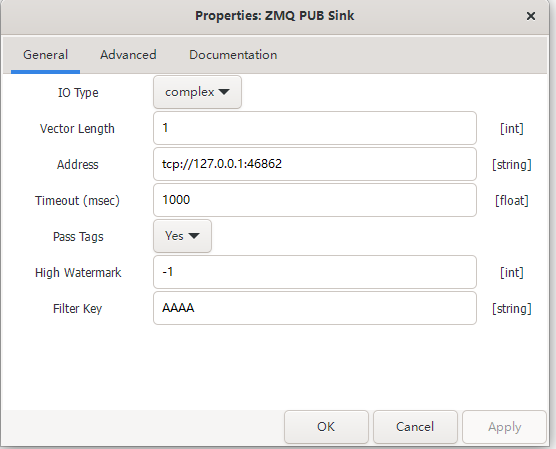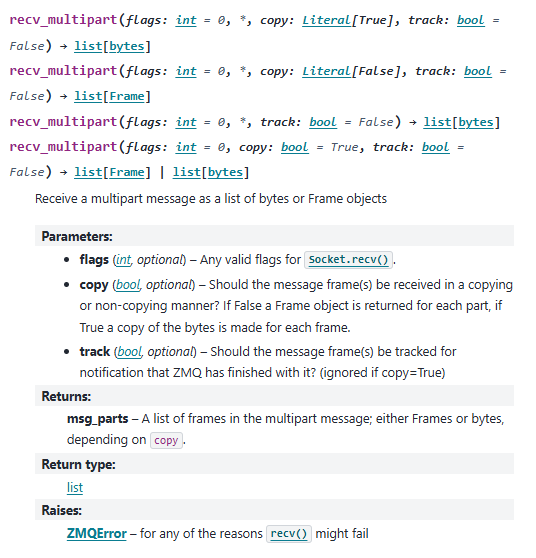GNU-Radio中可以用ZMQ模块实时输数据给其他程序,相比UDP模块更加稳定。

GNU-Radio中的ZMQ模块可以设置"Pass Tags"和"Filter Key",官网的描述如下:
Wire Format The ZMQ stream blocks have the option to pass tags. In addition, the PUB/SUB blocks support filtering. Both of these options affect the ZMQ wire protocol. When a filter string is supplied to a PUB/SUB block, GNU Radio uses multi-part messages to send the filter string, followed by the payload. Non-GNU Radio code attempting to interface with GNU Radio ZMQ blocks must be prepared for this part, and discard it. Note that the sender only sends this message part if a non-empty filter has been specified. Next, if sending tags is enabled, any tags within the window of the data to be sent are encoded in a special format and prepended to the payload data. If tags are not enabled, this header is elided. These two features make matching the sender configuration to the receiver configuration essential. Failure to do so will cause runtime errors in your flowgraph.
文中提到了"Filter Key"是用ZMQ的"multi-part messages"来发送的,pyZMQ中提供的方法如下: 
测试了一下返回值如下图,可以看到我设置的’AAAA’被列出来了,很可惜"Pass Tags"还是和发送的数据连在一起。
[b'AAAA', b'\xf0_\x01g\xe6G\x01\x00\x00\x00\x00\x00\x00\x00\x00\x00\x00\x00\x00\x00\x00\x80?\x00\x00\x0 ....]解析Pass Tags
首先用GNU-Radio发送直流信号(常数),对比"Pass Tags"有没有的区别。

左半边是设置了"Pass Tags"的,右半边是没设置"Pass Tags"的。可以看到"Pass Tags"在头部额外添加了一段数据,共19Bytes:
f05f01684f1400000000000000000000000000多接收几组数据看看"Pass Tags"
长度(Bytes) Pass Tags
32783 f05f0159df2c00000000000000000000000000
32787 f05f0158ff2c00000000000000000000000000
32783 f05f01581f2d00000000000000000000000000
32787 f05f01573f2d00000000000000000000000000
32783 f05f01575f2d00000000000000000000000000
32787 f05f01567f2d00000000000000000000000000
32783 f05f01569f2d00000000000000000000000000
32787 f05f0155bf2d00000000000000000000000000
32783 f05f0155df2d00000000000000000000000000
65551 f05f0154ff2d00000000000000000000000000
32787 f05f01533f2e00000000000000000000000000大致可以看出前面一段f05f015是固定的,后面的是数据的序号。不过GNU-Radio是开源的,所以不如直接翻翻源码。
从push_sink_impl.cc模块一步一步下翻就能找到gnuradio-3.10.10.0/gr-zeromq/lib/tag_headers.cc:31 std::string gen_tag_header(uint64_t offset, std::vector<gr::tag_t>& tags),这个函数用来生成Pass Tags的。
#define GR_HEADER_MAGIC 0x5FF0
#define GR_HEADER_VERSION 0x01
std::string gen_tag_header(uint64_t offset, std::vector<gr::tag_t>& tags)
{
std::stringbuf sb("");
std::ostream ss(&sb);
uint16_t header_magic = GR_HEADER_MAGIC;
uint8_t header_version = GR_HEADER_VERSION;
uint64_t ntags = (uint64_t)tags.size();
ss.write((const char*)&header_magic, sizeof(uint16_t));
ss.write((const char*)&header_version, sizeof(uint8_t));
ss.write((const char*)&offset, sizeof(uint64_t));
ss.write((const char*)&ntags, sizeof(uint64_t));
for (size_t i = 0; i < tags.size(); i++) {
ss.write((const char*)&tags[i].offset, sizeof(uint64_t));
pmt::serialize(tags[i].key, sb);
pmt::serialize(tags[i].value, sb);
pmt::serialize(tags[i].srcid, sb);
}
return sb.str();
}可以看到头部共19个字节,分别为2字节0x5FF0,1个字节0x01,8个字节offset,8个字节ntags。 用上面的数据看一下:
32783 f05f0159df2c00000000000000000000000000
32787 f05f0158ff2c00000000000000000000000000把offset部分提取出来,数据是小端格式的,得到的数据如下:
59df2c0000000000 --> 2940761
58ff2c0000000000 --> 2948952观察一下offset的变化,我传输的是float类型的数据,正好对应一个元素4字节。
再传输一下complex数据试试,一个元素应该是8字节。
32779 f05f01ef6ca804000000000000000000000000
32787 f05f01ee7ca804000000000000000000000000
78150894-78146799 = 4095
32779 = 19 + 4095 * 8